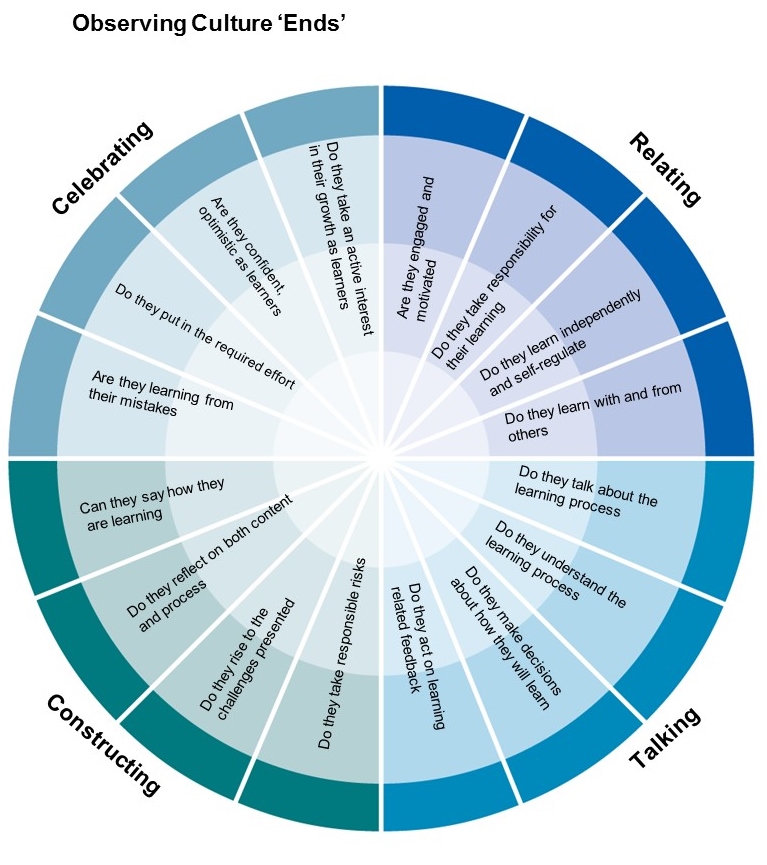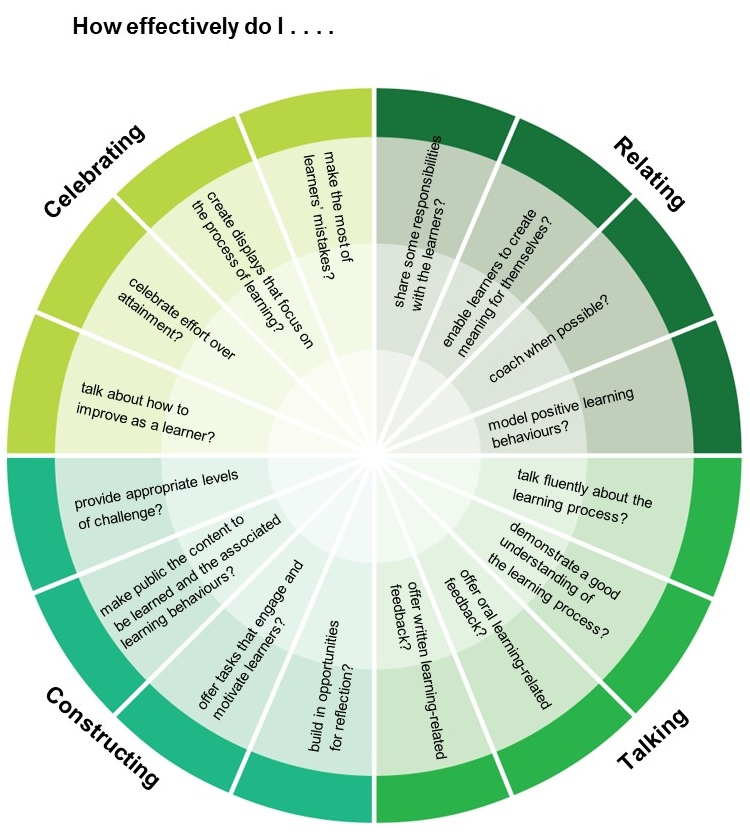About Section 2. Launching and sustaining the journey
You may well be intrigued by many of the ‘learning power’ ideas but that’s a world away from introducing and supporting the programme over time.
So to ensure the success of the programme we can offer a range of unique pick and mix support packages for leaders and learning champions. You can shape your own support package to ensure it will be just right for your school and its budget. The support package will assist you with:
- introducing the approach to staff (see section 1 below)
- sustaining the smooth running of the whole endeavour (see section 2 below)
These two aspects of the support packages for Phase 1 of the programme are outlined below. It’s up to you to pick and mix them to suit your needs.
You are now in section 2. Sustaining the journey.
Use the navigation bar to move between sections.
1. Making a start, launching the programme.
To ensure your programme makes a solid start we offer four different flavours of making a start.
A. Launching the programme yourself (DIY)
The DIY offer has resources you could use to introduce the programme to staff and others e.g. governors. There are slide decks, resource booklets and activities designed to enable you to put your own introductory training together for the programme as a whole and later for each unit of the programme. These resources don’t just amount to simple show and tell sessions – they are designed to provoke deep thinking about each aspect of the programme: its aims; learning and how it grows; the culture of the classroom; the design of lessons.
There are 5 slide decks:
- Introducing ‘Playing the Learning Power Game‘ i.e. the whole programme
- Introducing each of Units 1, 2, 3 and 4 in Phase 1
Each has a pack of resources containing;
- a slide deck with notes
- further explanatory / commentary notes
- activities to deepen thinking
B. Launching the programme via Zoom
If you don’t feel comfortable enough to introduce the programme yourself you can request our assistance via Zoom training. The most popular time for such Zoom sessions has been after school on Tuesday, Wednesday or Thursdays. Talk with us about what’s convenient for your school.
The ‘Zoom introductory training’ pack consists of:
- two 75 ish minute Zoom sessions, a couple of weeks apart
- Online pre-session preparation packs, sent to each participant a week before each event, containing;
- short pre-session introductory film, quizzes and activities to try
- a resource booklet to download and print
- the session timetable and its activities
- two post session tasks to be completed fairly promptly
- an overview description of the programme staff are about to embark on.
During these two sessions staff will come to understand their own students as learners and be ready to start on the programme at Phase 1 Unit 2.
C. Managing the programme via Learning Champions
Getting something new going evenly and consistently across a large school can be tricky. To overcome this many larger primary schools and secondary schools often prefer to spread the load of managing the programme. This can be done by identifying a group of staff, who we’ll call ‘Learning Champions’, who learn together by working their way through part of ‘Playing the Learning Power Game’ programme before using this experience to involve all staff. Thereafter they manage the Professional Learning Team sessions. This package includes a separate on-line resource especially for ‘Learning Champions’.
Learning Champions:
- need a 3 month lead time to become familiar with ‘Playing the Learning Power Game‘ and the opportunity to iron out any practical problems. i.e. they start at least 3 months before the rest of the school
- create practical experience of the approach within the school which can act as a ‘go to’ resource for other staff
- offers senior leaders a significant group of teachers ready, willing and able to support / encourage others
- The slides from the DIY package are also made available for this team.
D. Launching the programme with an in-school training day
Alternatively you might want to assign one of your 5 training days to launch the programme with staff. Such days at the beginning of terms are in very short supply and early booking would be essential. This in-school training day is designed to introduce staff to how students’ learning behaviours develop, how knowing that will influence the idea of learning friendly classrooms and their role as the teacher.
The four hour morning session knits together research based inputs with interactive analytical activities. These serve to encourage staff to consider their own teaching style, its impact in the classroom and what they might do to change this for the benefit of learning behaviours. From the start staff are encouraged to contribute their own learning habits to ensure the session is a rich learning opportunity for everyone.
The two hour afternoon session is reserved for the leadership team. Discussion concentrates on their role of supporting and managing the development of students’ learning characters, how this might affect classroom culture and curriculum design.
Each member of staff will use a richly illustrated resource book which will act as a reference text for months to come.
2. Support to keep things going smoothly
Both phases of the core programme can be optionally augmented by further live virtual consultancy sessions, typically scheduled to last 75–90 minutes, and with associated resources.
All the following support packages are conducted via Zoom sessions at times to suit schools.
1. Keeping it on track (leaders)
How it works.
This support package consists of three 75 minute Zoom sessions for leaders spread through the first year. These are scheduled to coincide with key Phase 1 milestones namely…
- after the first couple of months when staff have completed their students’ learning profiles (e.g. start Nov), to ponder/discuss student profiles and what they reveal
- three months later when teachers have had time to make shifts in their classroom culture and are about to start applying the ideas to curriculum/lesson plans (e.g. start March), to discuss progress in classroom culture.
- three or four months later when staff are exploring more learning behaviours and preparing for phase two of the programme (e.g. start June), to discuss lesson design and steps to prepare for Phase 2.
Possible subjects include;
- Managing our expectations
- Highlights and concerns
- Changing the focus of classroom observation
- What are we learning from looking for learning?
- Engaging parents with Learning Power
2. How’s it going? (teachers)
How it works
The emphasis of this support package is on teachers monitoring their own development. It consists of three 75 minute Zoom sessions for a group of about 8-10 teachers spread across the year. These can be scheduled to coincide with key Phase 1 milestones…
- when staff have completed their students’ learning profiles.
- when teachers have had time to make shifts in their classroom culture.
- when staff are exploring more learning behaviours in preparation for phase two of the programme.
Possible subjects include;
- What have we learned from students’ learning profiles?
- Tools and techniques for observing learning power in lessons;
- Designing lessons to enhance learning powers
3. Learning Champion support.
How it works
The Learning Champion route is aimed at larger schools. It’s important that this team itself feels supported and stretched. To enable this we have prepared a specialised on-line resource for the start of their journey; this is part of the package. Thereafter as Champions begin to lead learning teams across the school it’s important that support for them continues.
Possible subjects include;
Learning Champion support consists of five 75 minute Zoom conversations across 4 terms covering;
- Becoming a team and the job to be done ( an introduction to the programme and their role)
- Overcoming difficulties of drawing up student learning profiles (after a couple of months)
- Lessons from becoming and developing as a team (things to take forward as they begin to lead other teams)
- Keeping track and celebrating progress (things to be aware of or watch out for as teams progress)
- Where to next? (an introduction to Phase 2 of the programme)
3. Dedicated leadership resources
Leading Playing the Learning Power Game and Leading The Professional Learning Power Game are on-line resources that support the leadership of the two phases of the programme.
Both are designed to offer you, as senior leaders, a view of the strategic concerns that will arise when the school takes on a whole school programme to develop powerful learners. They offer questions, think pieces, frameworks, slide decks, diagrams and monitoring tools to help leaders:
- feel reassured about the purpose, benefits and frameworks of learning power;
- explore important leadership roles when taking on the development of Learning Power through the school;
- introduce units of the programme to staff;
- maintain a secure momentum into the future;
- understand ways forward beyond the initial stage;
- monitor the progress and value of the whole enterprise.
Every school starting the programme will receive the Leading Playing the Learning Power Game resource. This will be customised to the specific variety of launch package the school has selected to meet their needs.
You are now in section 2. Sustaining the journey.
Use the navigation bar to move between sections.









Comments are closed.